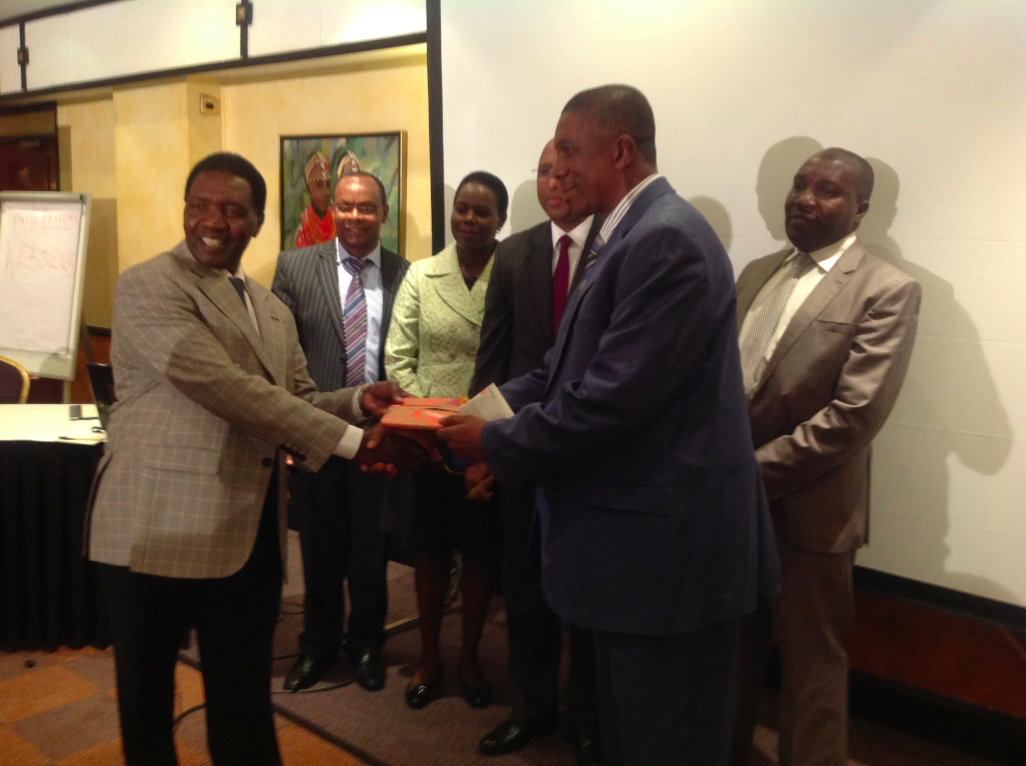Kenya takes over FAO/WHO Codex Coordinating Committee for Africa

The ceremonial handover of the CCAFRICA Coordinator from Cameroon to Kenya took place on 24th Feb 2016 at the Serena Hotel in Nairobi.
The event was attended by Mr Adan Mohamed (Cabinet Secretary-Ministry of Industry, Investment and Trade), Madam Awilo Ochieng Pernet (Chairperson of the Codex Alimentarius Commission), Represenatatives of FAO and WHO as well as Stephen Ibae from Cameroon the outgoing Regional Coordinator. Stakeholders from Industry, Regulatory Bodies and Consumer Organisations were in also in attendance.
As Coordinator for Africa, Kenya will work on responding to the region’s concerns on food standards and food control. It will continue to promote mutual exchange of information on proposed regulatory initiatives and address problems arising from food control, as well as stimulate and strengthen food control infrastructures. Concretely, these include the development of frameworks to guide market infrastructures, food processing and storage facilities among others.
CCAFRICA Chair Moses Gichia
The new Chair of the Coordinating Committee Mr Moses Gichia, speaking to the Codex Secretariat said Kenya would be aiming to "minimize the prevalence of foodborne disease and increase intra-African trade. This can be achieved by use of Codex Standards and other texts".
Since the country became a member of Codex in 1969, the Kenya Bureau of Standards has adopted over 200 Codex Food Standards and several codes of practice to protect the health of consumers and to facilitate trade.
Links
Read a full report from Kenya's Daily Nation
Learn more about CCAFRICA here
At the heart of the Codex mandate are the core values of collaboration, inclusiveness, consensus building and transparency. Governmental and non-governmental, public and private organizations alike play a vital role in ensuring Codex texts are of the highest quality and based on sound science.
Codex would have little authority in the field of international standard setting if it did not welcome and acknowledge the valuable contributions made by observers. Expert technical bodies, industry and consumer associations
contribute to the standard-setting process in a spirit of openness, collaboration and transparency.
Intergovernmental organizations (IGOs) and international non-governmental organizations (NGOs) can apply for observer status in Codex in order to attend and put forward their views at every stage of the standard-setting process.
 Current Codex Alimentarius Commission
Current Codex Alimentarius Commission
Kenya takes over FAO/WHO Codex Coordinating Committee for Africa

The ceremonial handover of the CCAFRICA Coordinator from Cameroon to Kenya took place on 24th Feb 2016 at the Serena Hotel in Nairobi.
The event was attended by Mr Adan Mohamed (Cabinet Secretary-Ministry of Industry, Investment and Trade), Madam Awilo Ochieng Pernet (Chairperson of the Codex Alimentarius Commission), Represenatatives of FAO and WHO as well as Stephen Ibae from Cameroon the outgoing Regional Coordinator. Stakeholders from Industry, Regulatory Bodies and Consumer Organisations were in also in attendance.
As Coordinator for Africa, Kenya will work on responding to the region’s concerns on food standards and food control. It will continue to promote mutual exchange of information on proposed regulatory initiatives and address problems arising from food control, as well as stimulate and strengthen food control infrastructures. Concretely, these include the development of frameworks to guide market infrastructures, food processing and storage facilities among others.
CCAFRICA Chair Moses Gichia
The new Chair of the Coordinating Committee Mr Moses Gichia, speaking to the Codex Secretariat said Kenya would be aiming to "minimize the prevalence of foodborne disease and increase intra-African trade. This can be achieved by use of Codex Standards and other texts".
Since the country became a member of Codex in 1969, the Kenya Bureau of Standards has adopted over 200 Codex Food Standards and several codes of practice to protect the health of consumers and to facilitate trade.
Links
Read a full report from Kenya's Daily Nation
Learn more about CCAFRICA here
 Codex and Observer
Codex and Observer
around the world since ancient times.
We might not always know where it comes from,
but we expect it to be available, safe and of good quality.









Leave a comment